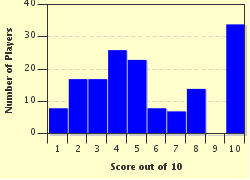
Take this Unusual Words Quiz! Average Trivia | Vocabulary
I'll give you the definition of ten obscure words. You drag the correct word from the list given to its rightful spot next to each definition. Have fun.
A matching quiz
by Creedy.
Estimated time: 4 mins.
